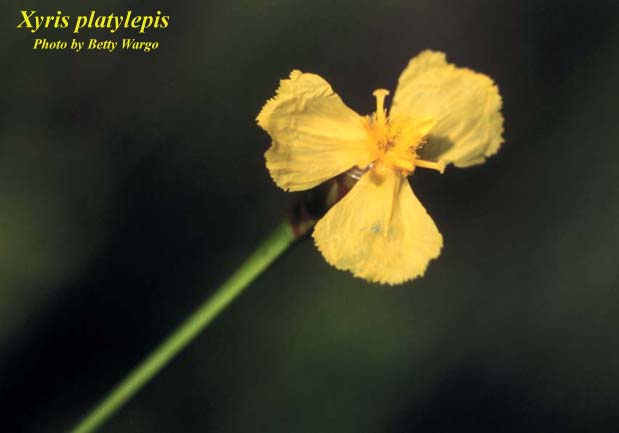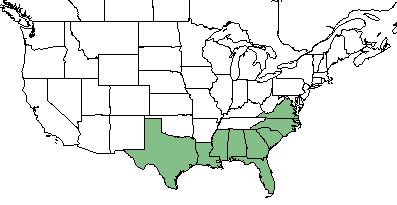Xyris platylepis
Common names: tall yelloweyed grass
| Xyris platylepis | |
|---|---|

| |
| Photo by Betty Wargo hosted at Atlas of Florida Plants | |
| Scientific classification | |
| Kingdom: | Plantae |
| Division: | Magnoliophyta - Flowering plants |
| Class: | Liliopsida - Moncots |
| Order: | Commelinales |
| Family: | Xyridaceae |
| Genus: | Xyris |
| Species: | X. platylepis |
| Binomial name | |
| Xyris platylepis Kunth | |

| |
| Natural range of Xyris platylepis from USDA NRCS Plants Database. | |
Contents
Taxonomic Notes
Synonyms: none
Varieties: none
Description
X. platylepis is a native perennial forb that is a member of the Xyridaceae family.[1] Leaves are linear, 20-40 cm long and 5-10 mm wide, mostly smooth. Outermost leaves are scale-like, and quickly turn to a dull brown color. Spike is broadly elliptic or oblong, with closely imbricate bracts. Seeds are ellipsoidal approximately 0.5 mm long.[2]
Distribution
The native distribution of X. platylepis consists of the Southeast United States, ranging from eastern Texas to southern Virginia. It has been introduced to Hawaii's main island.[1]
Ecology
Habitat
X. platylepis can be found in savannahs, sandhill seeps, and ditches as human disturbed habitats throughout its distribution.[3] This includes moist to wet sands as well as sandy peats of pineland pond margins, bogs and marshes. [2] X. platylepis has also been observed in a range of habitats including wet loamy sand between pine woods and cypress-gum swamps, moist sand on grassy roadsides, moist sandy loam, wet peat, and sphagnous bog.[4] Preferred habitat for X. platyepis is seepage-fed habitats with herbaceous seepage slopes with mesic or wet flatwoods and prairies or cypress domes that include Sphagnum mosses.[5]
Phenology
Flowering time ranges from August until November in the season.[4]
Fire ecology
Populations of Xyris platylepis have been known to persist through repeated annual burning.[6]
Conservation, cultivation, and restoration
Cultural use
Photo Gallery
References and notes
- ↑ 1.0 1.1 USDA Plants Database URL: https://plants.usda.gov/core/profile?symbol=XYPL
- ↑ 2.0 2.1 Kral, R. (1960). "The genus Xyris in Florida." Rhodora 62(743): 295-319.
- ↑ Weakley, A. S. (2015). Flora of the Southern and Mid-Atlantic States. Chapel Hill, NC, University of North Carolina Herbarium.
- ↑ 4.0 4.1 Florida State University Robert K. Godfrey Herbarium database. URL: http://herbarium.bio.fsu.edu. Last accessed: May 2018. Collectors: Loran C. Anderson, Cecil R. Slaughter, Robert K. Godfrey, Rodie White, Robert L. Lazor, R. Kral, Chas. C. Deam, R. E. Perdue, Jr., O. Lakela, and Richard S. Mitchell. States and Counties: Florida: Wakulla, Franklin, Gadsden, Volusia, Suwannee, Levy, Baker, Leon, Liberty, Orange, Highlands, Brevard, De Soto, Hillsborough, and Manatee. Alabama: Lowndes. Georgia: Grady.
- ↑ Observation by Edwin Bridges, Highlands County Fl., August 3, 2015, posted to Florida Flora and Ecosystematics Facebook Group.
- ↑ Platt, W.J., R. Carter, G. Nelson, W. Baker, S. Hermann, J. Kane, L. Anderson, M. Smith, K. Robertson. 2021. Unpublished species list of Wade Tract old-growth longleaf pine savanna, Thomasville, Georgia.